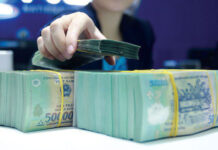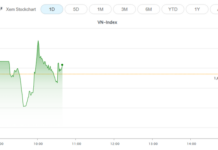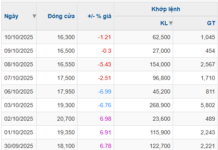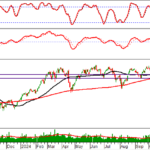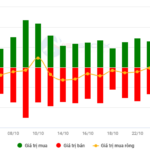 Mr. Nguyen Viet Duc, Director of Digital Sales at VPBank Securities (VPBankS)
|
Forex rates are tense and unpredictable towards the year-end, with multiple variables at play.
Analyzing the impact of exchange rates on the market, Mr. Duc believes that forex rates are a crucial factor to monitor as they reflect the broader narrative of inflation, interest rate differentials, and capital flows.
Historically, when Trump ascended to the US presidency in 2016, the US dollar strengthened significantly. More recently, as Trump appeared to gain an edge in the elections, the dollar surged once again. Therefore, if Trump were to actually win, there’s a high likelihood that the DXY (US Dollar Index) could reach 108.
Specifically for Vietnam, in addition to exchange rates, the focus is also on the resurgence of bond yields. At the beginning of the year, we anticipated that the Fed would cut interest rates, leading to a decline in bond yields. However, with Trump’s potential victory, US bond yields have climbed back up to nearly 5% – an unexpected development that could spell trouble not just for the Vietnamese stock market but also globally.
Trump’s policies are often associated with ballooning budget deficits. When the budget deficit widens, there’s a need to issue more bonds, making it challenging for bond yields to decrease rapidly. The only way to entice buyers is by maintaining the current yields.
Furthermore, the interbank exchange rate has risen by approximately 2.18% in the past month and 3.69% since the beginning of the year. The appreciation of the exchange rate, coupled with a deteriorating balance of payments, is cause for concern.
In the first six months of the year, the balance of payments recorded a deficit of around $7 billion, whereas, during the same period last year, it was positive at $3-4 billion. Upon scrutinizing the balance of payments, we find that while exports, imports, and FDI remain stable compared to the previous year, certain elements have deteriorated. These include external debt payments of $2.4 billion, foreign divestment of $2 billion, and errors and omissions amounting to $4 billion (possibly stemming from unrecorded money transfers).
These factors have compelled the State Bank of Vietnam (SBV) to take more proactive measures, including issuing bills and repurchasing USD from commercial banks (already buying about $2 billion). This indicates a certain level of tension in the current exchange rate situation.
Moreover, it’s unclear if the US dollar has peaked yet. The market is currently in a state of anticipation, waiting to see who will emerge victorious between Trump and Harris, which will provide insights into the direction of US policies.
The US elections, scheduled for November 5, typically yield a clear winner within a couple of days. However, this year’s contest is considered one of the tightest in American history, suggesting that the results may not be known until mid-November or early December.
Regarding exchange rate and stock market scenarios for the end of 2024, Mr. Duc predicts that if the DXY reaches 104, the VN-Index could find its bottom at 1,240 points. If the situation deteriorates further, we should prepare for a scenario where there’s only a brief rebound before retesting the strong bottom of 1,200 points in Q4. He also emphasizes historical data, which shows a strong inverse correlation between rising exchange rates and a declining stock market.
In the short term, macro factors take precedence over corporate earnings. Mr. Duc points out that the current P/E ratio of the VN-Index is 14, which is the average for the past 10-15 years. This is not considered a bargain, as a P/E of 10 would indicate a buying opportunity that only presents itself once every five years.
Additionally, the market, in the near term, is influenced more by macro factors than corporate earnings. While earnings would be positive in a stable macroeconomic environment, the sharp depreciation of the exchange rate in October (3%) has shifted the focus away from corporate performance.
Although it’s challenging to make predictions for the remainder of the year, there are a few expectations for 2025. Firstly, with the anticipated upgrade of Vietnam’s stock market status in 2025, it’s advisable to invest in any discounted securities. Secondly, the surge in apartment prices bodes well for developers who don’t rely on bonds and have immediate inventory to sell. Lastly, banks, being dependent on the broader economy and the real estate sector, could be worth considering if the property market experiences a robust recovery in 2025.
Huy Khai
The Market Beat: A Surprising Rebound Led by Banking and Real Estate Sectors
The VN-Index staged a strong recovery in the afternoon session, buoyed by gains in the banking and real estate sectors. It closed the day up 5.85 points, or 1.264.48%. The HNX-Index also turned green, rising 0.49 points to 226.36, while the UPCoM-Index edged slightly lower, falling 0.08 points to 92.38.
The Stock Market Optimist: Can We Expect a Revival in Liquidity?
The VN-Index rallied and retested the 100-day SMA. A decisive move above this level, coupled with trading volume surpassing the 20-day average, would reinforce the bullish momentum. Notably, the Stochastic Oscillator has provided a buy signal within the oversold region. If this buy signal persists and the index climbs out of this oversold territory in upcoming sessions, the outlook will turn even more positive.
The Cautious Sentiment Persists
The VN-Index showed promising gains despite trading volume remaining below the 20-day average. This indicates a persistent cautious sentiment among investors. For the upward momentum to be sustained, an improvement in trading volume is necessary in the coming days. The Stochastic Oscillator is currently dipping into oversold territory, and a buy signal from this indicator, coupled with a volume boost, would reinforce a more positive short-term outlook.
The Flow of Funds: Riding the Storm, How Far Will the Market Correction Go?
The stock market witnessed a steep decline of almost 33 points, or 2.5%, last week—the biggest drop since the end of June 2024. This significant downturn caused a break in the VN-Index’s support channel, which had been intact since the August 2024 lows. Experts unanimously deemed this a negative technical signal, a harbinger of potential challenges ahead for investors.










